
Source: Sharecast
According to the Financial Times, which cited unnamed sources close to the talks, Rachel Reeves is weighing up a temporary exemption from the tax of two or three years on new listings.
When you buy shares in the UK, you typically pay a tax of 0.5% on the transaction, though the duty is no longer applicable to stocks on AIM. The US, China and Germany do not have an equivalent fee for share transactions.
“The government is keen to get more Brits investing and is looking at various ways to encourage greater participation rather than people simply saving in cash. UK stock market listing rules were relaxed in 2024 and offering a three-year stamp duty holiday on certain stocks is a natural next step," said Dan Coatsworth, head of markets at AJ Bell.
Andrew Bresler, chief executive at Saxo UK, welcomed the potential move as a "positive step" but called for a full abolition of stamp duty, which he claims would improve liquidity across London's financial markets and boost global competitiveness.
Stamp duty on share transactions raised £3.3bn of tax revenues in 2023, according to Peel Hunt estimates. However, at just 0.4% of overall tax receipts, the duty is a "negligible contributor" to Treasury reserves, Bresler said.
"Stamp duty on share trading should be abolished across the board if the UK is serious about revitalising its capital markets [...] Full abolition would remove a clear barrier to international investment in UK equities, help unlock the large pool of retail investors currently sitting in cash, and encourage those favouring US markets to re-engage with their home market."


